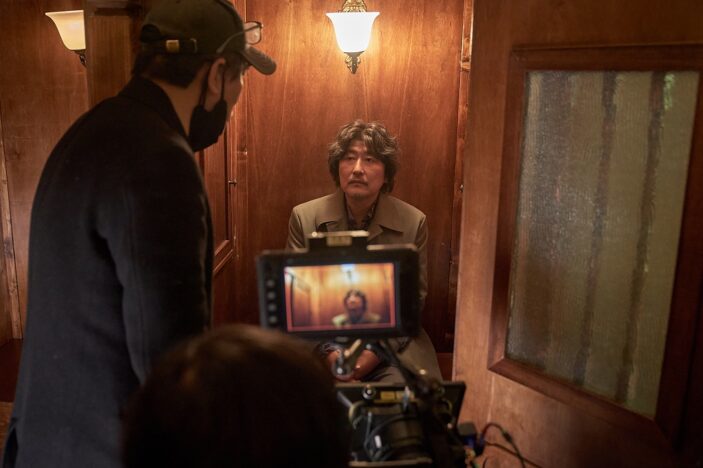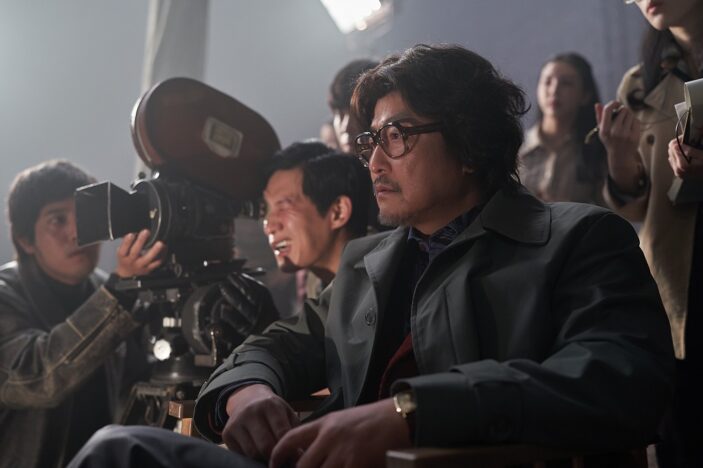
In 1970s Korea, when both art and dreams are censored, a film director dreams of a masterpiece.
After delighting audiences at both this year’s Cannes Film Festival and Sydney Film Festival, Cobweb is spinning its way into Australian cinemas from October 5th (you can read our review here).
To coincide with the release, Peter Gray was invited to the global press conference to hear director Kim Jee-woon and lead actor Song Kang-ho speak about the film’s creative origins, their long-running collaborative relationship, and what audiences can expect to take away from their wicked black comedy.
Cobweb explores the world of filmmaking and deals with critics, censorship, and conflict among creators, which must be quite close to your life as a film director. Can you please share with us the creative origin of Cobweb?
Kim Jee-woon: Well, through the global pandemic, everything came to a halt, and the cinema industry was no exception
I think that it wasn’t just me, but all over the world everyone involved in the industry, including the creators, directors, actors, and everyone involved really, through COVID when everything came to a halt, I’m sure everybody, in their own way and through their own ideas really got the time to rethink about what cinema really means to them.
I’m sure everyone asked questions like “What is Cinema?” And what does “film mean to me?” And I thought about when I first fell in love with cinema, and I asked myself, “What does film mean to me personally?” It actually served as a time for me to really reignite and reconsider my love that I had for cinema; it gave me time to self-reflect, and also self-redefine and re-establish what cinema holds in my heart.
I think that I try to show the questions that I also asked myself when I first fell in love with cinema. And I tried to ask those questions through this film. I’m sure that all filmmakers have gone through experiences where they were met with obstacles and hindrances; they had to really break through that all filmmakers, not just in Korea, but all around the world, carry that narrative with them. I wanted this to be a film that allows you to really rekindle the love that you have for cinema. Think about it once again, reassure yourself, and I think I wanted it to be sort of an encouragement to not just me, but everyone who is involved in cinema all over the world, to really rekindle that romance as well as encourage yourself to move even further.
So I would say this is a very delightful tale with a touch of black comedy that tells the story of this one man who breaks through that turmoil and conflict at a very destitute state.
And to our other “director”, Song Kang-ho, this is your first time playing the role of a film director. How did you feel, and what were the main areas of focus in your performance? And also, do you see yourself in the director’s chair one day?
Song Kang-ho: I think that it’s not important to really focus on the profession of film directing itself, but rather more emphasis should be put on, and I myself also put more thoughts into really how to carry out that energy of wanting to push forth until the end, in a confined space with so many different characters with one purpose and one goal of finishing this film.
As for the second question, I think that the role of an actual film director I believe it’s beyond my personal capabilities, and so, no (laughs), I would say I do not have plans to sit in the director’s chair. What I have on my plate as an actor is enough.
And this is your fifth collaboration with director Kim Jee-woon on a feature film. How does it feel to work with him?
Song Kang-ho: It’s been 25 years, I believe, so we created five films together within a span of 25 years, and every time, I feel like I am going on a journey of cinema with (director) Kim. Every time I get very excited, and I have high hopes. I always wonder what the destination is going to be at times I admit there is a sense of fear, but more than that, there’s a huge sense of excitement and just anticipation, and that was also the case this time. I get asked a lot by the Korean press as well as to what is my secret to working with Kim so many times and members of the press will look at me and think that I sort of represent the face or “look” of the Korean male actor, but I have to say I’m the least good looking actor out there (laughs). There are so many good-looking Korean actors, and I think it’s because of that aspect of me sort of being able to appear like an everyday man; that is the secret to director Kim casting me.

Could you also tell us what has changed the most since your first collaboration in the film The Quiet Family?
Song Kang-ho: It started out as a very simple, yet fun (journey) and very charming beginning place. I feel like throughout our journey, the world has widened to become more experimental, more provocative, and more innovative, and it has led us to experience a lot more adventures along the way. I think that’s really is the essence of the amazing and surprising world cinemas created by director Kim.
I’m curious as to why you set the story in the 1970’s. Is it because it was a time of confusion, much like what the characters in the film go through? Or were you just drawn to the film scene of that era?
Kim Jee-woon: Well, having been born in the 70s, I have a very strong nostalgia for everything that happened during the 1970s. And I believe that if you look at all of the Korean films today, it all indicates that they are very similar and akin to that of the 70’s.
When you look at the Korean film history, we went through the first renaissance in the 1960’s. And then in the 1970s we had state censorship and a little bit of forced production of certain establishment or government-forced movies. And so we went through quite a dark time in cinema. If you look at the numbers, we used to have about 220 films per year, that dropped drastically in the 70s to about only 100 per year. That is very similar to what the Korean cinema is currently going through after the pandemic.
Going through those dark times and a very difficult time in case cinema, I got to thinking, “How did our directors or filmmakers that were senior to me…how did they break through those hard times?” “How did they succeed in bringing about a second renaissance?” I came to really think about those things. And also by translating the spirit that our filmmakers had at that time allowed them to break through those hardships into my film, Cobweb. These days in Korea, we often say that what’s important is the undying spirit, and I wanted to show that through the character (of Kim). I thought that looking at what happened back in the 70s, and how the second renaissance of Korean cinema was able to take place, I feel like now is a very good time to tell that story.
What do you think fans should be looking out for when they go see the film?
Kim Jee-woon: I hope that through Cobweb if there are any of you out there who have really lost your love of cinema and feel like you no longer love or care for cinema, I hope that this film will provide a chance for you to rethink about that. I also hope that it will allow you to fall back in love with cinema.
Song Kang-ho: No one goes to the box office if they don’t like cinema. And I think, in that sense, it would be very interesting to approach the film thinking what position in our hearts and in our daily lives does cinema take up.
I know there are so many (services) out there; we have such a wide array of channels through which you can be exposed to a lot of different content, especially after the pandemic. However, I think the act of going to the theatre, buying the tickets, and making yourself go to the theatre to enjoy a movie…nothing really quite captures or provides you that cinematic energy as that act itself. I think that through (this film) you will be able to once again rekindle that spirit that you have, and I am confident that you definitely will.
Cobweb is screening in Australian theatres from October 5th, 2023.
